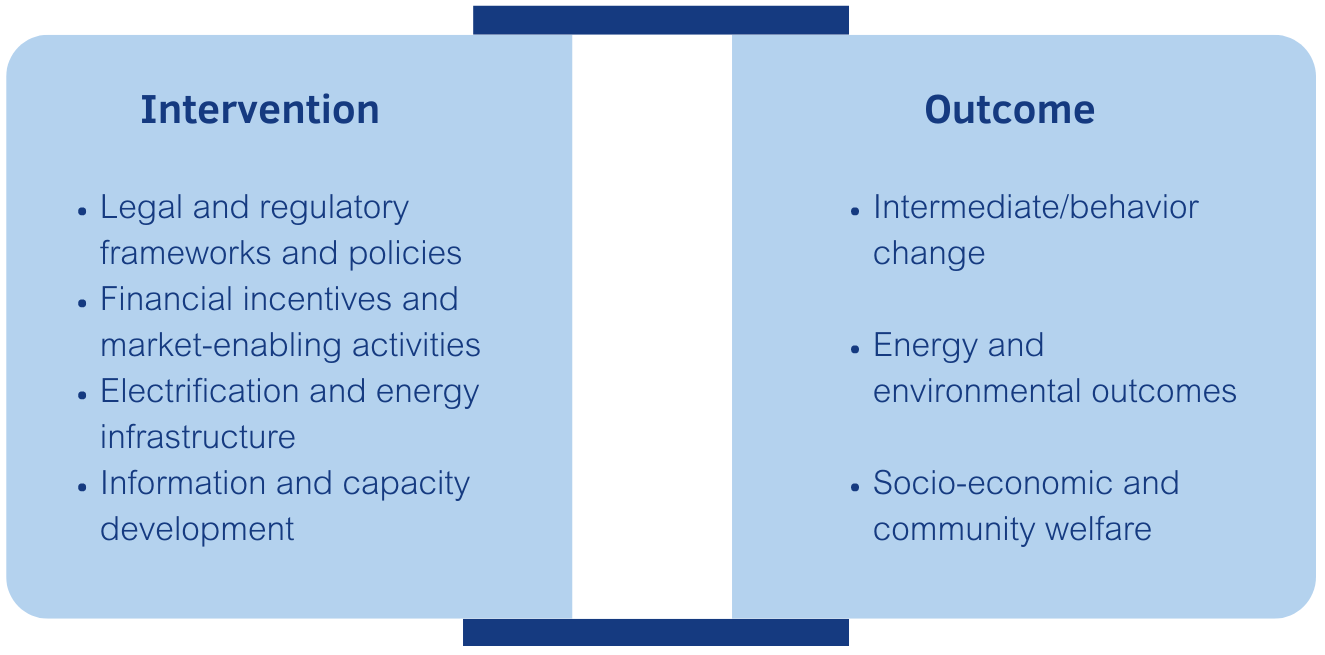Progress towards achieving Sustainable Development Goal (SDG) 7 – to ensure universal access to energy and clean cooking, the adoption of renewables and an increase in energy efficiency – has been mixed. While electricity access has improved in select countries, clean cooking remains a prevalent issue for one in three people globally. Findings from 3ie’s latest evidence gap map (EGM) – co-produced with Sustainable Energy for All (SEforALL) – will support policymakers and practitioners in leveraging existing research and evidence to address the challenges more effectively. This groundbreaking work is the first such initiative to map sustainable energy interventions in low- and middle-income countries, to the best of our knowledge.
Global public good to address urgent needs
Halfway through the implementation of the SDGs, the international community highlighted the urgent need to address sustainable energy by including ‘Energy Compacts’, voluntary commitments to accelerate progress on SDG7, as one of the High Impact Initiatives at the 2023 SDG summit, and called for a “transition away from fossil fuels” for a more sustainable future at COP28.
Efforts to promote sustainable energy can now utilize the most rigorous and updated evidence mapped and synthesized by 3ie and SEforALL. Our EGM is a global public good providing stakeholders a mapping of 703 studies (668 impact evaluations and 35 systematic reviews).
The interactive map (available here) is based on a framework that includes four intervention and three outcome domains:
Evidence clusters and gaps
The large and recent evidence base is concentrated around a few intervention categories pointing to evidence gaps. Of the 668 impact evaluations included, nearly half have been published in the past three years (2021-2023).
This growing body of evidence is clustered around four interventions:
- sustainable upgrades (e.g. improved cookstoves);
- other energy regulations and policies (e.g., daylight savings time);
- subsidies and other transfers (e.g., electric grid connection subsidies); and
- on-grid systems (e.g., electrification projects).
We also identified absolute evidence gaps in three intervention categories which future research should prioritize:
- insurance and other risk guarantee instruments (e.g., insurance for businesses and communities for upgraded energy systems and infrastructure),
- push and pull finance (e.g., results-based financing aligned to energy sustainability objectives), and
- advocacy and diplomacy (e.g., promoting collaboration and cooperation in the energy sector).
Geographically, too, evidence is concentrated, with major evidence gaps in countries with the greatest energy access deficits. Despite the recent surge in evidence, it remains concentrated around two countries: close to half of all IEs were conducted in China or India. We find that countries where less than 20% of the population has access to electricity (Burundi, Central African Republic, Chad, Democratic Republic of Congo, Malawi and South Sudan) have no evaluations of on-grid or off-grid electrification interventions.
Near-equal number of evaluations assessed the three outcome targets of SDG 7: energy access, efficiency and renewables. We find that 33% of the evidence base comprises evaluations of interventions aimed at multiple targets. For example, the provision of solar energy promoting both access and the use of renewable energy.
Study designs vary by intervention categories. While 75% of impact evaluations used a quasi-experimental design, we see in many of the intervention categories there is a dominant evaluation approach. For instance, within the legal and regulatory frameworks domain, all studies utilized quasi-experimental designs, while randomized designs were the most popular method for studies evaluating sustainable upgrades and information dissemination interventions.
Few high and medium confidence systematic reviews have been conducted. Of the 35 reviews included in the map, eight were appraised as having high or medium confidence. Six of these focused on sustainable upgrades, most commonly on improved cookstoves. At an aggregated level, the high or medium confidence reviews highlighted a need for additional rigorous impact evaluations of energy interventions, the importance of studying different contexts when implementing interventions, and the integration of cost data and more consistency when measuring outcomes across studies.
Next steps
The EGM provides an easy-to-access platform to explore the rigorous evidence base on sustainable energy interventions. Considering the sharp growth of the evidence base over the past three years, updating the map regularly will likely prove an important exercise to ensure policymakers and researchers continue to have access to the most up-to-date evidence. In the short term, and based on the EGM findings, we are conducting a systematic review to understand the effectiveness, barriers and facilitators of off-grid interventions. The results of the review will be presented at the SEforALL Global Forum in September 2024.
The EGM technical report is available here. To find out more about 3ie's work on sustainable energy, visit our webpage, or write to us at info@3ieimpact.org.












